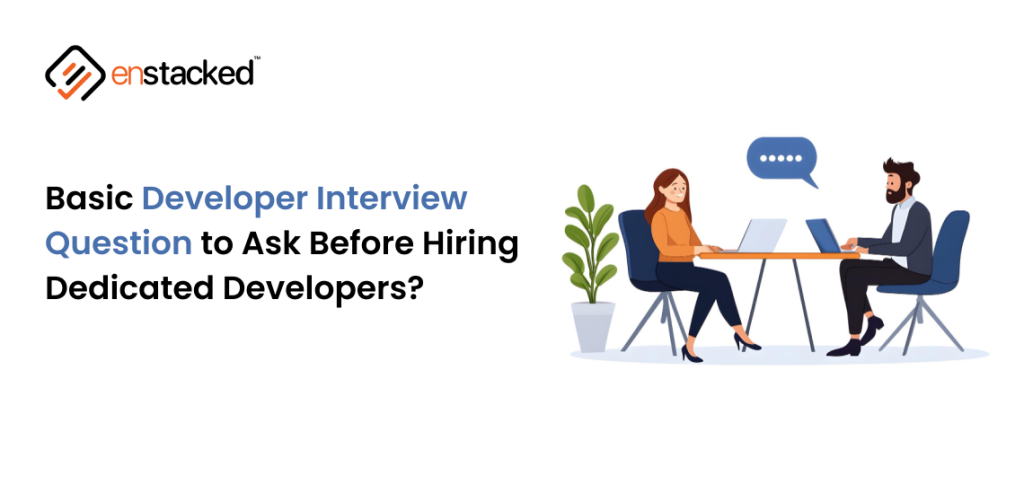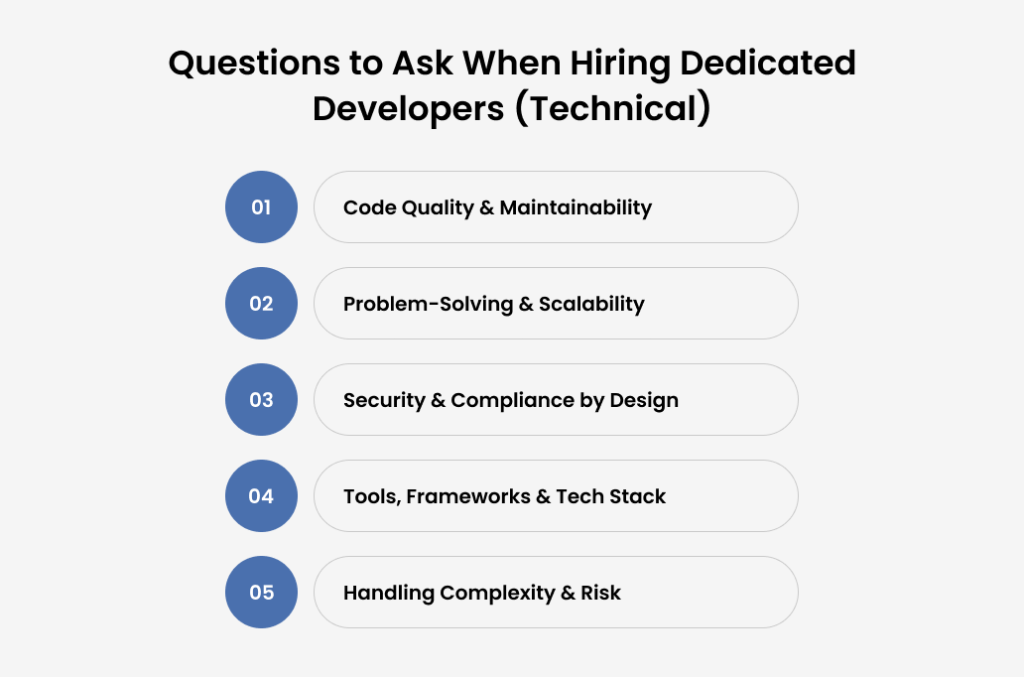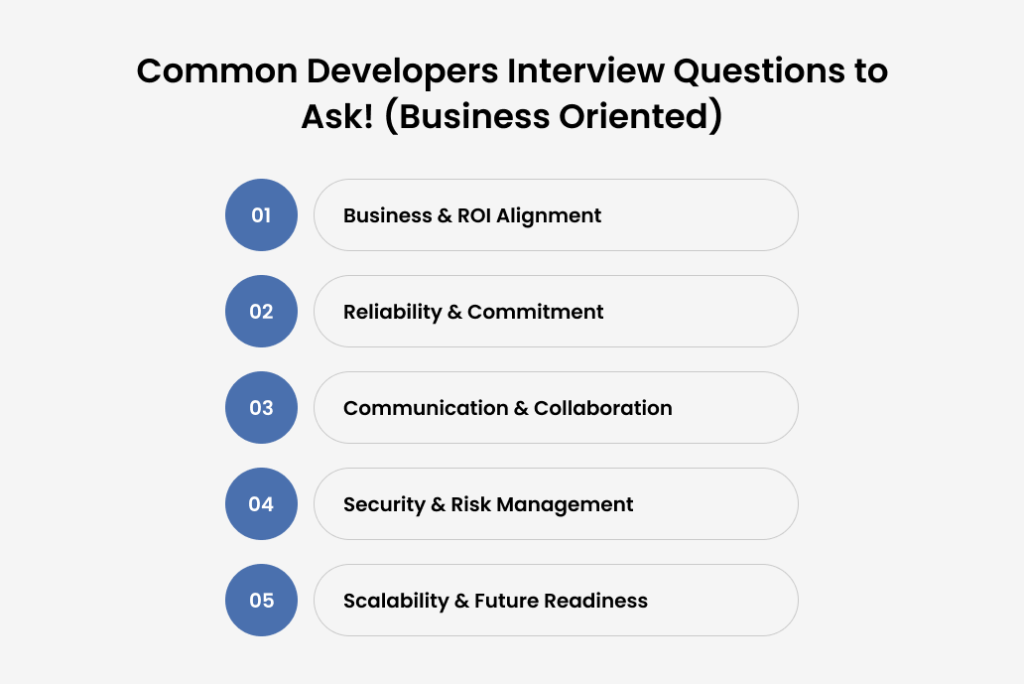
Bringing a developer onto your team isn’t just about filling a vacancy. It’s about entrusting someone with the very code that drives your business forward. And while resumes, portfolios, and price tags tell part of the story, they don’t reveal everything you need to know.
The wrong choice can slow down projects, create hidden costs, or even derail entire initiatives.
Did you know that the average cost of hiring the wrong employee is estimated at US $17,000?
The right choice, on the other hand, can expedite delivery, reduce overhead, and provide your business with the agility it needs to stay ahead.
That’s why the smartest leaders and best companies don’t just hire developers; they carry the process with the right questions. Questions that uncover how a developer thinks, collaborates, secures your data, and scales solutions for tomorrow’s needs, not just today’s tasks.
In this blog, we’ll walk through the most important interview questions to ask before hiring dedicated developers. Let’s get into it.
Questions to Ask When Hiring Dedicated Developers (Technical)

While assessing a developer’s technical skills, here are some of the common interview questions for developers that you should ask to know their technical depth, relevance to your requirements, and other details.
1. Code Quality & Maintainability
Even simple basic developer interview questions can reveal a lot about long-term reliability.
- How do you ensure your code remains clean, maintainable, and easy for another developer to pick up?
- What’s your process for code reviews and automated testing?
- How do you document your work so that future developers or teams can continue seamlessly?
2. Problem-Solving & Scalability
These common interview questions for developers test how they handle real-world complexity.
- Can you describe a system you built that needed to handle rapid scaling? How did you plan for growth?
- When performance issues arise, what’s your step-by-step approach to diagnosing and fixing them?
How do you balance writing quick solutions vs. building scalable architectures?
3. Security & Compliance by Design
Technical execution directly ties into business risk.
- How do you approach secure coding practices from day one?
- Have you implemented compliance requirements like GDPR or HIPAA in past projects?
- Can you walk through an example of how you identified and resolved a security vulnerability?
4. Tools, Frameworks & Tech Stack
This helps ensure they’re not just familiar but proficient in your stack.
- Which frameworks, libraries, and tools do you specialize in, and why?
- Have you worked with CI/CD pipelines for faster and more reliable deployments?
- How do you decide whether to use open-source solutions or build custom ones?
5. Handling Complexity & Risk
Dedicated developers often step into ongoing projects, which tests adaptability.
- How do you approach taking over an existing codebase with technical debt?
- What’s your strategy for integrating with APIs or third-party systems?
- Can you share an example where your technical choices prevented a project failure?
Common Developers Interview Questions to Ask! (Business Oriented)

Hiring dedicated developers isn’t just a technical decision; it’s a business decision. The right hire can accelerate delivery and reduce costs, while the wrong hire can derail entire initiatives. So, go beyond coding tests and ask developers interview questions that uncover how a candidate will impact the business, not just the codebase.
1. Business & ROI Alignment
These go beyond basic developer interview questions and uncover whether a developer understands the bigger picture:
- How do you ensure that your work directly contributes to business goals, not just technical outputs?
- What steps do you take to prevent budget overruns or missed deadlines?
- Can you give an example where your decision helped save costs or accelerate delivery?
2. Reliability & Commitment
For leaders, stability is as important as skill. These common interview questions for developers test long-term commitment:
- How do you balance multiple projects if demand spikes?
- What’s your approach to knowledge transfer if you move off a project?
- How do you ensure availability during critical phases, like product launches?
3. Communication & Collaboration
Dedicated developers often work across time zones and teams. Poor communication is one of the biggest risks for businesses.
- How do you handle misaligned expectations with non-technical stakeholders?
- Can you adapt your communication style for executives who want business outcomes, not technical jargon?
4. Security & Risk Management
In today’s environment, leaders care deeply about protecting customer trust and business data.
- How do you design with security in mind from the start?
- What’s your process for handling sensitive data or compliance requirements (GDPR, HIPAA, PCI-DSS)?
- Can you describe a situation where you identified and resolved a potential security risk before it became an issue?
5. Scalability & Future Readiness
Business leaders aren’t just solving today’s problems; they’re building for tomorrow.
- How do you make sure your solutions can scale as the business grows?
- What’s your approach to technical debt, and how do you prevent it from slowing down the company later?
- Can you share an example of a system you built that supported rapid business growth?
Red Flags to Watch Out for When Hiring Dedicated Developers
Asking the right questions is only half the battle. The other half is knowing when the answers reveal potential risks. Here are some red flags business leaders should pay close attention to during the interview process:
- Vague or Generic Answers
If a developer struggles to provide specific examples of past work, or gives broad textbook responses, it’s a sign they may not have real, hands-on experience.
- Overpromising Timelines
Beware of candidates who promise delivery at unrealistic speeds without explaining their process. Overconfidence often translates into missed deadlines later.
- Poor Communication Skills
A developer who can’t explain technical concepts in simple, business-friendly terms will make collaboration with leadership and non-technical teams difficult.
- Lack of Security Awareness
If a developer doesn’t proactively mention data protection, compliance, or secure coding practices, it’s a red flag, especially for businesses handling sensitive information.
- No Long-Term Thinking
Candidates who only focus on getting it done and ignore scalability, maintainability, or technical debt could cost your company heavily in the future.
- Reluctance to Share Code or References
If a developer hesitates to provide portfolio work, GitHub samples, or client references, it raises questions about transparency and reliability.
Final Thoughts
Here’s the wrap on everything you need to know about the basic developer interview questions that you need to hire dedicated developers who your business deserves.
The takeaway is simple: don’t just hire developers, hire with intent. When you ask the right developer interview questions, you don’t just get code, you get commitment, clarity, and a competitive edge.
If you’re ready to move beyond the hassle of recruitment, onboarding, and training, and want to hire dedicated developers who are already vetted to meet these standards, our team at Enstacked is here to help. Book a free trial with us today, and experience how the right talent can accelerate your projects from day one.

